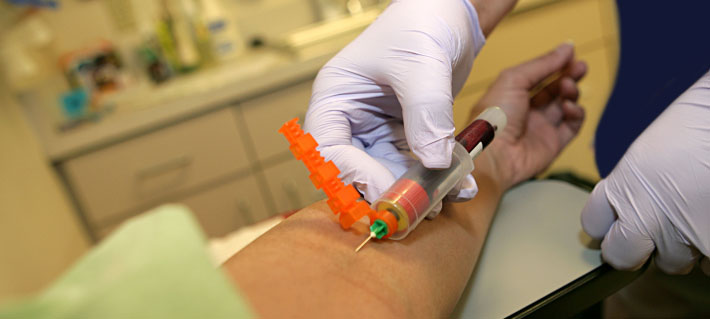
Phlebotomy is the medical practice of drawing blood from patients for various purposes, including diagnostic testing, medical procedures, blood donation, or research.
A trained healthcare professional known as a phlebotomist performs this procedure, typically using a needle to puncture a vein and collect blood samples.
Phlebotomy is a crucial aspect of healthcare, as blood samples are essential for diagnosing and monitoring various medical conditions, assessing overall health, and providing necessary treatments.
Phlebotomists must follow strict protocols to ensure patient safety, maintain sample integrity, and prevent the spread of infection.
Phlebotomists may work in hospitals, clinics, laboratories, blood donation centers, or other healthcare settings.
Why should you take this course online?
Taking a phlebotomy course online offers several advantages for individuals looking to enter the field of healthcare:
Flexibility
Online phlebotomy courses allow students to study at their own pace and on their schedule.
This flexibility is ideal for individuals who have work or family commitments and cannot attend traditional in-person classes.
Accessibility
Online courses eliminate geographical barriers, allowing students from anywhere in the world to access quality education.
This is particularly beneficial for those living in rural areas or areas without easy access to educational institutions offering phlebotomy programs.
Cost-Effectiveness
Online courses often have lower tuition fees compared to traditional on-campus programs.
Additionally, students can save money on commuting, parking, and other expenses associated with attending classes in person.
Customized Learning Experience
Online phlebotomy courses often offer a variety of multimedia resources, including videos, interactive modules, quizzes, and virtual simulations.
Students can tailor their learning experience to suit their individual learning styles and preferences.
Self-Paced Learning
Online courses provide students with the opportunity to progress through the material at their own pace.
This allows individuals to spend more time on challenging topics while moving quickly through material they already understand.
Skills you will acquire as a phlebotomist
As a phlebotomist, you’ll acquire a diverse set of skills essential for safely and effectively collecting blood samples and interacting with patients. Here are some key skills you’ll develop:
Venipuncture Techniques
Mastering venipuncture techniques is fundamental for drawing blood safely and efficiently.
You’ll learn how to properly locate veins, select appropriate puncture sites, and use needles to collect blood samples with minimal discomfort to the patient.
Specimen Collection
You’ll acquire skills in collecting various types of blood specimens, including whole blood, serum, plasma, and capillary blood.
Proper handling and labeling of specimens are essential to ensure accurate test results and maintain sample integrity.
Infection Control
Phlebotomists must adhere to strict infection control protocols to prevent the transmission of infectious diseases.
You’ll learn about proper hand hygiene, personal protective equipment (PPE) usage, and disinfection procedures to maintain a safe working environment for both patients and healthcare providers.
Patient Interaction
Effective communication and interpersonal skills are essential for building rapport with patients and alleviating their anxiety during blood collection procedures.
You’ll learn how to explain procedures, address patient concerns, and provide emotional support compassionately and professionally.
Medical Knowledge
While not as extensive as that of other healthcare professionals, phlebotomists need a basic understanding of medical terminology, anatomy, physiology, and common laboratory tests.
This knowledge enables them to communicate effectively with other healthcare professionals and understand the purpose of blood tests.
Factors to consider before taking this course
Before enrolling in a phlebotomy course, it’s important to consider several factors to ensure that it aligns with your goals, needs, and circumstances.
Here are some key factors to consider:
Career Goals
Determine whether a career in phlebotomy aligns with your long-term career goals and aspirations.
Research the role of a phlebotomist, potential career paths, and job opportunities in your area to ensure that it’s the right fit for you.
Educational Requirements
Understand the educational requirements for becoming a phlebotomist in your region.
Some employers may require completion of a phlebotomy training program and certification, while others may accept on-the-job training or a high school diploma/GED.
Course Accreditation
Choose a phlebotomy course that is accredited by a recognized accrediting body or institution.
Accredited programs meet specific quality standards and are more likely to provide comprehensive education and training.
Curriculum Content
Review the curriculum of the phlebotomy course to ensure that it covers essential topics such as venipuncture techniques, infection control, medical terminology, and specimen handling.
Look for courses that offer hands-on training and clinical experience.
Cost and Financial Aid
Consider the cost of the phlebotomy course, including tuition fees, textbooks, supplies, and any additional expenses.
Research whether financial aid, scholarships, or payment plans are available to help offset the cost of the program.
Where will you work?
As a phlebotomist, you can work in a variety of healthcare settings where blood collection and specimen handling are essential. Some common places of employment include:
Hospitals
Hospitals employ a large number of phlebotomists to collect blood samples from patients for diagnostic testing, transfusions, and other medical procedures.
Phlebotomists may work in various departments within the hospital, including the emergency room, outpatient clinics, and laboratory.
Clinics and Medical Offices
Phlebotomists may work in medical clinics, physician’s offices, or healthcare centers where they collect blood samples from patients during routine check-ups, screenings, or specialized procedures.
Diagnostic Laboratories
Diagnostic laboratories hire phlebotomists to collect blood specimens and other biological samples for analysis.
Phlebotomists in this setting may work alongside laboratory technicians and technologists to ensure accurate test results.
Blood Donation Centers
Blood donation centers rely on phlebotomists to collect blood donations from volunteer donors.
Phlebotomists in this setting must follow strict protocols to ensure the safety and integrity of donated blood products.
Nursing Homes and Long-Term Care Facilities
Phlebotomists may work in nursing homes, assisted living facilities, or long-term care facilities to collect blood samples from residents for diagnostic testing and monitoring of health conditions.
Also read: